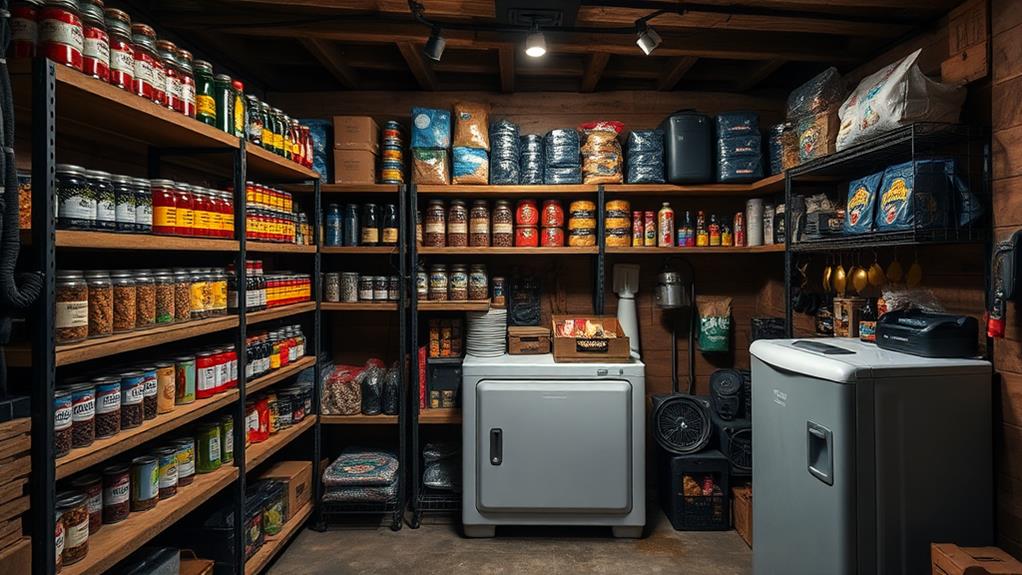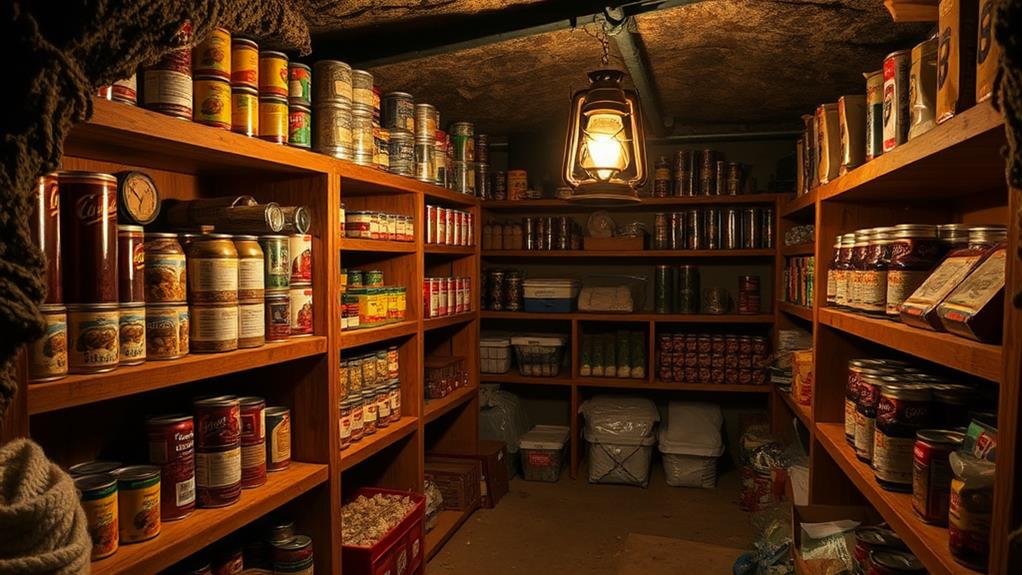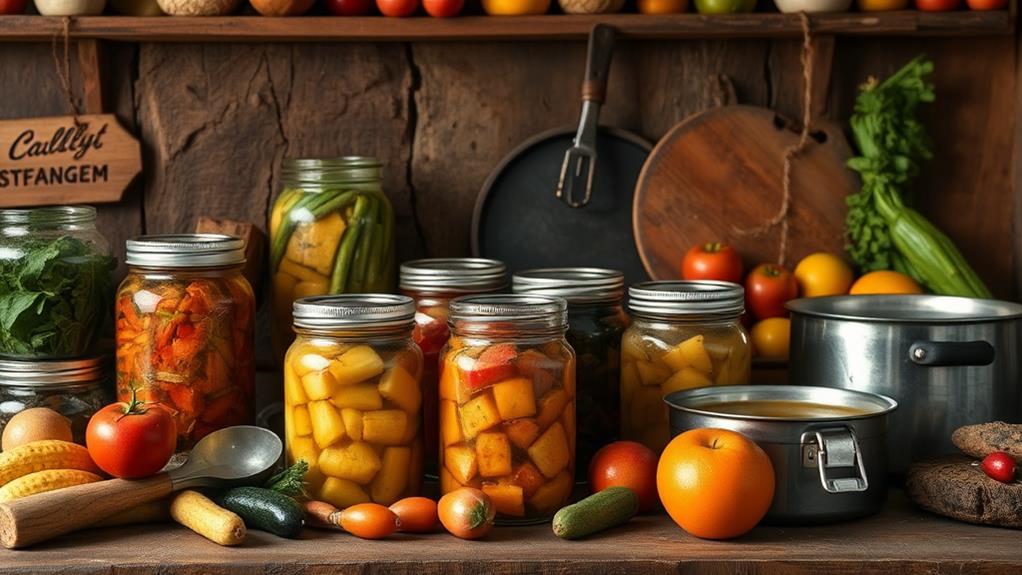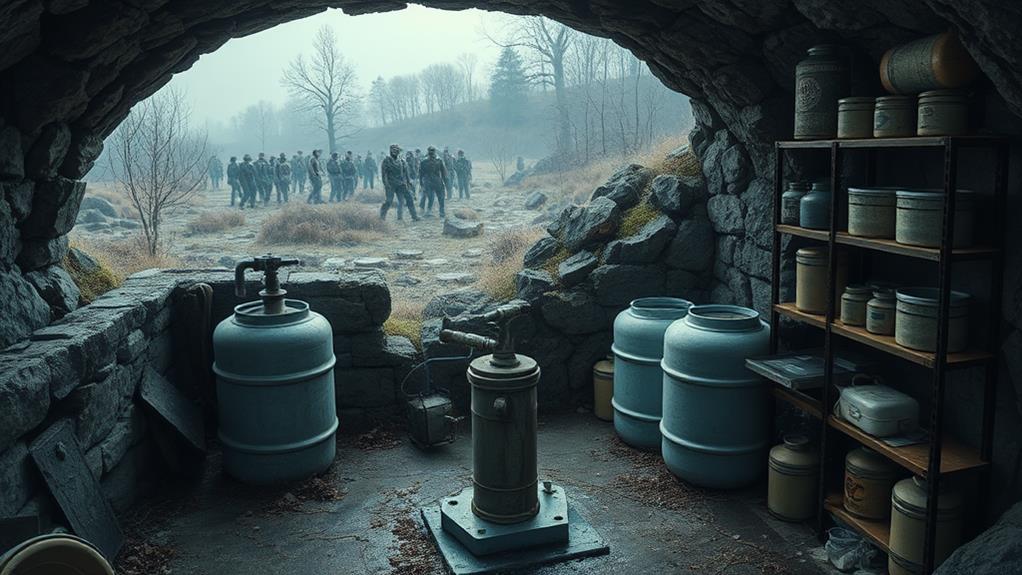
Surviving in Zombieland demands smart food and water strategies. Start by stockpiling non-perishables like canned goods, dried beans, and high-energy snacks. Use solar-powered fridges or root cellars for cold storage. Preserve your harvests through canning, ensuring jars are sterilized and properly sealed. Dehydrate fruits, veggies, and meats to extend shelf life. Secure your water by identifying natural sources, setting up rainwater harvesting systems, and using purification methods. Always rotate your stock to avoid spoilage and maintain freshness. Curious about other survival hacks? There's a lot more to cover.
Stockpile Non-Perishables

In a world overrun by zombies, stockpiling non-perishables becomes essential for survival. You need to focus on foods that have long shelf lives and don't require refrigeration. Canned goods, dried beans, rice, pasta, and freeze-dried meals are your go-tos. They provide key nutrients and energy, pivotal when youire constantly on the move or holed up in a safe house.
Start by collecting a variety of canned vegetables, fruits, and meats. They're easy to store, last for years, and offer a balanced diet. Don't forget to include high-energy snacks like nuts, granola bars, and dried fruits. These items can be lifesavers during quick escapes or long hikes.
Make sure you've got plenty of water as well. Store bottled water and consider water purification tablets or portable filters. You never know when safe drinking water might run out.
Lastly, remember to rotate your stockpile. Use older items first and replace them with new ones. This guarantees that your supplies remain fresh and safe to consume. By taking these steps, you're giving yourself and your group the best chance at surviving the apocalypse.
Utilize Cold Storage
Cold storage becomes a game-changer in a zombie apocalypse scenario. You might think refrigeration is impossible without electricity, but there are practical solutions to keep your perishables fresh. First, consider investing in a solar-powered fridge or freezer. These can be lifesavers, using renewable energy that's often still accessible even when society collapses.
If solar power isn't an option, think about using evaporative cooling methods. A simple yet effective approach involves placing your food in clay pots and surrounding them with wet sand. The evaporation helps maintain a cooler internal temperature, preserving your food longer.
Another method is to utilize natural cold sources. If you're in a colder climate, use the outdoor environment to your advantage. Snow and ice can act as natural refrigeration units. Constructing an insulated icehouse or digging a root cellar can provide you with a reliable cold storage solution.
Lastly, remember to rotate your stock. Even in cold storage, food won't last forever. Keep track of expiration dates and consume older items first. By incorporating these cold storage strategies, you'll maximize your food's shelf life, ensuring you stay nourished and ready to face the undead.
Preserve With Canning

Canning is a tried-and-true method that can substantially extend the shelf life of your food during a zombie apocalypse. You'll want to have a reliable way to preserve the produce you've grown or scavenged, and canning does just that. It involves processing jars of food in a boiling water bath or pressure canner to kill bacteria, yeasts, and molds. This creates a vacuum seal that keeps your food safe and delicious for months, if not years.
First, gather canning supplies: jars, lids, and a canner. Cleanliness is vital—sterilize everything to avoid contamination. Fill your jars with prepped food and leave some headspace. Depending on the food type, process the jars in either a boiling water bath or a pressure canner. Always follow reliable recipes to guarantee safety.
- Stock up on canning basics: Jars, lids, and a good canner are essential.
- Follow trusted recipes: Safety is paramount, so stick to established guidelines.
- Label your jars: Write the date and contents to keep track of your inventory.
Dehydrate Your Food
When it comes to long-term food storage in a zombie apocalypse, dehydrating your food is a game-changer. You'll find that removing moisture from fruits, vegetables, and even meats extends their shelf life dramatically. Plus, dehydrated food is lightweight and compact, making it easy to carry if you're on the move.
To dehydrate your food, you can use a dedicated dehydrator, an oven, or even the sun. Simply slice your food thinly and spread it out on a tray. If using an oven, set it to a low temperature, around 140°F (60°C), and leave the door slightly open to let moisture escape. For sun drying, make sure your food is protected from insects and consider using a mesh cover.
Once your food is dehydrated, store it in airtight containers or vacuum-sealed bags to keep out moisture and contaminants. Label everything with the date so you can keep track of its age. Dehydrated foods can be rehydrated by soaking in water or added directly to soups and stews.
Secure Water Sources

After preparing a stash of dehydrated food, securing a reliable water source becomes your next priority. In Zombieland, clean water is just as vital as food. You can't afford to waste time or energy on contaminated sources. First, identify nearby natural water sources like rivers, lakes, or streams. Always purify the water before drinking it. Using a portable water filter or boiling the water for at least one minute can save you from various waterborne diseases.
Next, consider rainwater harvesting. Set up a system using gutters and barrels to collect and store rainwater. This method provides a renewable supply of water, especially during rainy seasons. Verify your barrels are covered to keep out debris and mosquitoes.
Lastly, stockpile bottled water. While not a long-term solution, it provides immediate hydration and is easy to store. Rotate your stock to verify it stays fresh and uncontaminated.
Remember, staying hydrated keeps you alert and ready for anything.
- Natural sources: Rivers, lakes, and streams, always purify.
- Rainwater harvesting: Use gutters and barrels.
- Bottled water: Stockpile and rotate regularly.
Securing water is non-negotiable for survival.
At a Glance
Picture a pantry brimming with canned goods, jars of preserved fruits, and neatly stacked dehydrated meats. Nearby, a cold storage hums softly, safeguarding your perishables. Water sources are secure, ensuring you and your loved ones stay hydrated. By mastering these five strategies, you've created a fortress of sustenance in a chaotic world. Remember, in Zombieland, a well-stocked and thoughtfully organized food supply isn't just survival—it's peace of mind wrapped in a blanket of preparedness.






